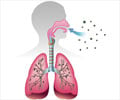An organic compound, often emitted by fungi, causes symptoms of Parkinson's disease in fruit flies, scientists at Rutgers and Emory universities have discovered.

"Parkinson's has been linked to exposure to environmental toxins, but the toxins were man-made chemicals," Inamdar said. "In this paper, we show that biologic compounds have the potential to damage dopamine and cause Parkinson's symptoms."
For co-author Joan Bennett, the research was more than academic. Bennett was teaching at Tulane University in New Orleans when Hurricane Katrina struck the Gulf Coast in 2005. Her house developed mold and fungus as a result.
"I knew something about 'sick building syndrome, because I am an expert in toxic fungi,'" Bennett remembered. "I didn't believe in it, because I didn't think it would be possible to breathe in enough mold spores to get sick."
But collecting mold and mildew samples in her own house, wearing a mask, gloves and protective gear, made her ill. "While I was doing the sampling, I felt horrible – headaches, dizziness, nausea. I had a conversion experience," said Bennett, now a professor of plant biology and pathology and associate vice president for the promotion of women in science, engineering and mathematics at Rutgers.
When she came to Rutgers, Bennett looked for some way to understand the connection between fungi and symptoms like those she had experienced. She needed a genetic model, and Inamdar convinced her to use fruit flies. Bennett received an initial grant from the university to pursue the work.
Advertisement
In 2010, they found 1-octen-3-ol. It's a volatile organic compound – a vaporous collection of molecules that evaporate from liquids or solids. When we smell something, pleasant or not, we're smelling volatile organic compounds. Bennett, for example, remembers that the odors in her flooded house "were just terrible."
Advertisement
Joan Bennett, an expert in fungi, had more than an academic interest in the work.One of the genes transports dopamine; the other packages it. Mushroom alcohol disrupts both the packaging of the dopamine and its transport, thus degenerating the neurons and causing the Parkinson's-like symptoms.
"There have been recent epidemiological studies indicating that people exposed to moldy or water-damaged buildings have developed neuropsychological problems and movement disorders," Inamdar said. "There have also been studies indicating that Parkinson's disease is increasing in rural areas, where it's usually attributed to pesticide exposure. But rural environments also have a lot of exposure to molds and other fungi, and our work suggests that 1-octen-3-ol might also be connected to the disease, particularly for people with a genetic susceptibility to it. We've given the epidemiologists some new avenues to explore."
Source-Eurekalert









